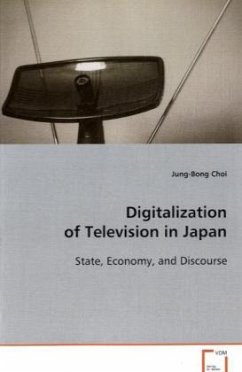JungBong Choi characterizes Japan'sintroduction of digital broadcasting as a political,cultural and economic endeavor orchestrated by theJapanese state and other para-state institutions. Inso doing the author employs a conceptof "digitalization," as opposed to "digitization,"defined as a social, institutional, and discursivemaking of digital television. With the analyticframework established, the author observes howthe identity of television in Japan was renewed asan apparatus conducive to the acceleration ofan informational capitalism. An innovative study inthe political economy of media, the book brings tolight ways in which digital technologies areengineered as a key device for socio-economicreordering. A stimulating appraisal of thecontemorary state, furthermore, it offers aperspective on the progressive conflation betweenstate and market, technology and institution, andcultural discourse and economic planning.
Bitte wählen Sie Ihr Anliegen aus.
Rechnungen
Retourenschein anfordern
Bestellstatus
Storno








